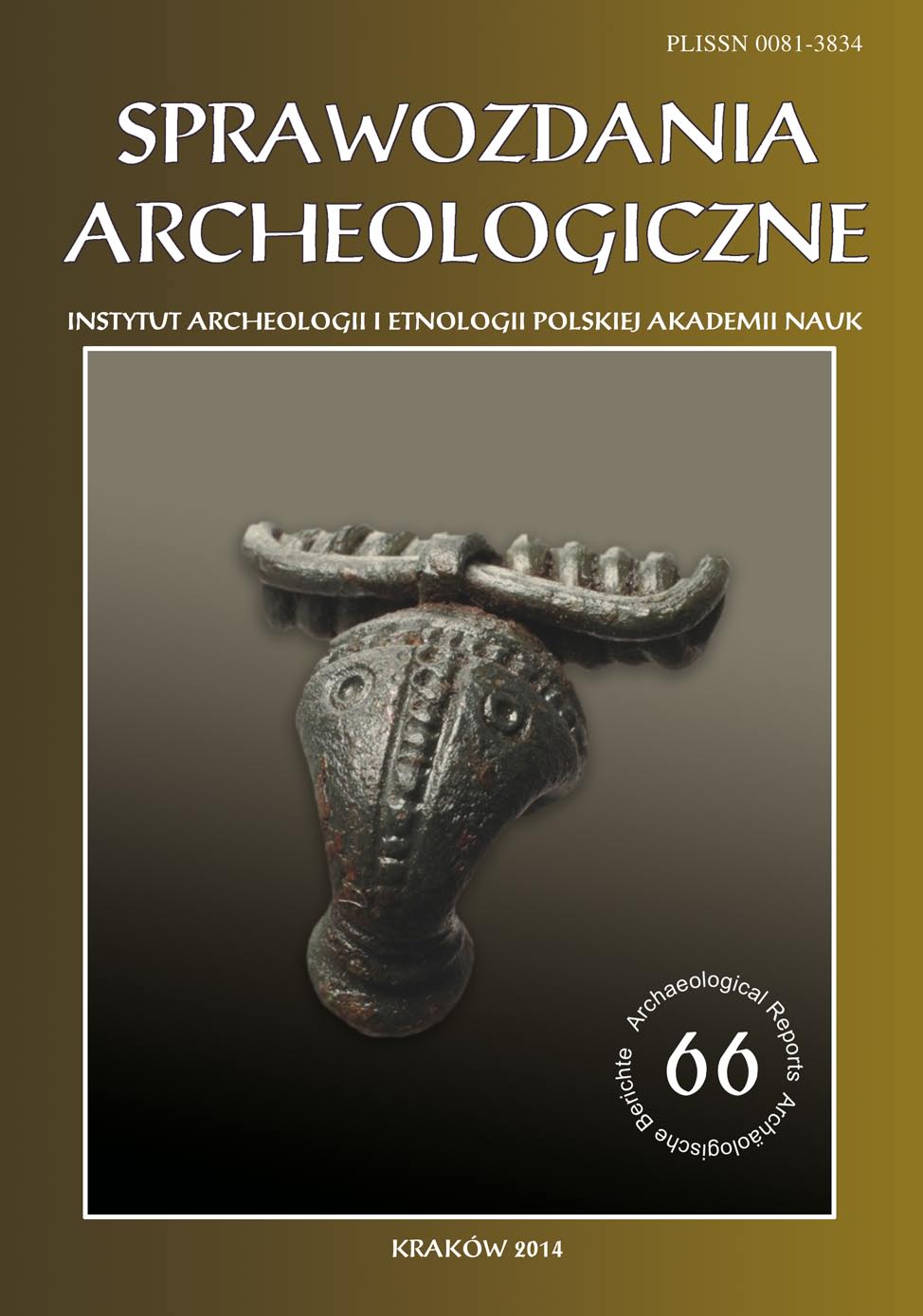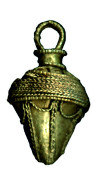The chronology of T-shaped axes in the Polish Lowland = Chronologia toporów T-kształtnych na Niżu Polskim
Keywords:
Polish Lowland, Kuyavia, Late Mesolithic, Early Neolithic, T-shaped axesAbstract
Prompted by the discovery of a small workshop producing axes of red deer antler (the so-called T-shaped axes) at Bodzia, site 1 (Kuyavia), this paper addresses the issue of the origin and chronology of the said axes. In the first place, we shall present the inventory the workshop yielded and then analyse the distribution of T-shaped axes in Europe, especially in the European Lowland, in the context of antler production of the Late Mesolithic communities of the circa Baltic zone and the southern coasts of the North Sea and also within the Early Neolithic groups in Northern Europe. We shall also recount the discussion that has recently developed around this question
Downloads
References
-
Bogucki P. 2008. The Danubian-Baltic Borderland: Northern Poland in the fifth millennium BC. Analecta Praehistorica Leidensia 40, 51–65
Cofta-Broniewska A., Kośko A. 1982. W poszukiwaniu rodowodu społeczeństwa Kujaw. Inowrocław Crombé P., Van Strydonck M. and Hendrix V. 1999. AMS-dating of antler mattocks from the Schelde river in northern Belgium. Notae Praehistoricae 19, 111–119
Cyrek K., Grygiel R. and Nowak K. 1982. Mezolit ceramiczny w środkowej i północno-wschodniej Polsce i jego związki z neolitycznymi kulturami niżowymi. Prace i Materiały Muzeum Archeologicznego i Etnograficznego w Łodzi. Seria Archeologiczna 29, 5–70
Czekaj-Zastawny A., Kabaciński J. and Terberger T. 2011. Long distance exchange in the Central European Neolithic: Hungary to the Baltic. Antiquity 85 (327), 43–58
-
Czekaj-Zastawny A., Kabaciński J. and Terberger T. 2013. The Origin of the Funnel Beaker Culture from a southern Baltic coast perspective. In S. Kadrow and Włodarczak P. (eds.), Environment and subsistence — forty years after Janusz Kruk’s „Settlement studies…” (= Studien zur Archäologie in Ostmitteleuropa/Studia nad Pradziejami Europy Środkowej 11). Rzeszów, Bonn, 409–428
Czekaj-Zastawny A., Kabaciński J., Terberger T. and Ilkiewicz J. 2013. Relations of Mesolithic huntergatherers of Pomerania (Poland) with Neolithic cultures of central Europe. Journal of Field Archaeology 38 (3), 195–209
-
Czerniak L. 1980. Rozwój społeczeństw kultury późnej ceramiki wstęgowej na Kujawach. Poznań
Czerniak L. 1994. Wczesny i środkowy okres neolitu na Kujawach 5400–3650 p.n.e. Poznań
Czerniak L. 2004. Kultury z cyklu ceramiki wstęgowej. In J. Bednarczyk and A. Kośko (eds.), Od długiego domu najstarszych rolników do dworu staropolskiego. Wyniki badań archeologicznych na trasach gazociągów Mogilno-Włocławek i Mogilno-Wydartowo. Poznań, 195–233
David É. 2008. Principes de l’étude technologique des industries osseuses et critčres de diagnose des techniques mésolithiques. Cours de trois heures du Séminaire de technologie osseuse de l’Université Paris X Nanterre (HMEPR202). Archives-Ouvertes CEL-SHS du Centre pour la Communication Scientifique Directe CCSd du CNRS [en ligne] http://cel.archives-ouvertes.fr/cel-00129410 (version 1, 2007, 150) version 2, 169
Gabałówna L. 1966. Ze studiów nad grupą brzesko-kujawską kultury lendzielskiej. Brześć Kujawski stanowisko 4 (= Acta Archaeologica Lodziensia 14). Łódź
Gob A. 1982. L’occupation mésolithique de l’abri du Loschbour près de Reuland (G.-D. de Luxembourg). In A. Gob and F. Spier (eds.), Le Mésolithique entre Rhin et Meuse. Actes du Colloque sur le Paléolithique supérieur final et le Mésolithique dans le Grand-Duché de Luxembourg et dans les régions voisines (Ardennes, Eifel, Lorraine), Luxembourg, 18–19 Mai 1981. Luxembourg, 91–117
Grygiel R. 1976. Osady kultury ceramiki wstęgowej rytej w Brześciu Kujawskim koło Włocławka (= Prace i Materiały Muzeum Archeologicznego i Etnograficznego w Łodzi, Seria Archeologiczna 23). Łódź, 5–111
Grygiel R. 2008. Neolit i początki epoki brązu w rejonie Brześcia Kujawskiego i Osłonek 2(3). Środkowy neolit. Grupa brzesko-kujawska kultury lendzielskiej. Łódź
Ilkiewicz J. 1989. From Studies on Cultures of the 4th Millennium BC in the Central Part of the Polish Coastal Area. Przegląd Archeologiczny 36, 17–55
Jensen G. 1991 Unusable axes? An experiment with antler axes of the Kongemose and Ertebølle cultures. Eksperimentel Arkaeologi (Lejre) 1, 8–21
Jeunesse Ch. 1997. Pratiques funéraires au Néolithique ancien. Sépultures et nécropoles danubiennes 5500–4900 av. J.-C. Paris
Kabaciński J. and Terberger T. 2009. From Late Hunter-fishers to Early Farmers on the Pomeranian Coast. New research at Dąbki 9, Koszalin District. In J. M. Burdukiewicz, K. Cyrek, P. Dyczek and K. Szymczak (eds.), Understanding the Past. Papers offered to Stefan K. Kozłowski. Warszawa, 165–184
Kabaciński J. and Terberger T. 2011. Pots and pikes at Dąbki 9, Koszalin district (Poland) — the early pottery on the Pomeranian coast. In S. Hartz, F. Luth and T. Terberger (eds.), Early Pottery in the Baltic-Dating, Origin and Social Context (= Bericht der Römisch-Germanischen Kommission 89). Mainz, 361–392
Kabaciński J., Terberger T. and Czekaj-Zastawny A. 2014. Chronology of T-shaped red dear antler axes from the Polish Baltic Coast, in press
Smoczyńska Ł. 1953. Kultura ceramiki wstęgowej w Wielkopolsce. Fontes Archaeologici Posnanienses 3, 1–84
Klassen L. 2004. Jade und Kupfer. Untersuchungen zum Neolithisierungsprozess in westlichen Ostseeraum unter besonderer Berücksichigung der Kultur entwicklung Europas 5500–3500 BC (= Jutland Archaeological Society 47). Århus
Klooss S. and Lübke H. 2006. The Terminal Mesolithic and Early Neolithic Logboats of Stralsund-Mischwasserspeicher. In R. Bockius (ed.), Between the Seas. Transfer and Exchange in Nautical Technology. Proceedings of the Eleventh International Symposium on Boat and Ship Archaeology (= RGZM-Tagungen 3). Mainz, 97–105
Kooijmans L. P. L. 2001a. Archeologie de Betuweroute Hardinxveld-Giessendam Polderweg. Een Mesolithisch jachtkamp in het rivierengebied (5500–5000 v. Chr.) (= Rapportage Archeologische Monumentenzorg 83). Amersfoort
Kooijmans L. P. L. 2001b. Archeologie de Betuweroute Hardinxveld-Giessendam De Bruin. Een kampplaats uit het Laat-Mesolithicum en het begin van de Swifterbant-cultuur (5500–4450 v. Chr.) (= Rapportage Archeologische Monumentenzorg 83). Amersfoort
Sidera I. 2001. Animaux domestiques, bętes sauvages et objets en matières animales du Rubané au Michelsberg. De l’économie aux symboles, des techniques à la culture. Gallia préhistoire 42, 107–194
-
Sobkowiak-Tabaka I. and Kabaciński J. 2012. Ratownicze badania wykopaliskowe Zespołu Archeologicznych Badań ratowniczych przy Ośrodku Studiów Pradziejowych i Średniowiecznych Instytutu Archeologii i Etnologii PAN w latach 2007–2008 na trasach budowy autostrad. In S. Kadrow (ed.), Raport 2007–2008. Warszawa, 11–41
Weninger B. 1986. High-precision calibration of archaeological radiocarbon dates. Acta Interdisciplinaria Archaeologica 4. Nitra, 11–53
Weninger B., Jöris O. 2004. Glacial Radiocarbon Calibration. The CalPal Program. In T. Higham, Ch. Bronk Ramsey and C. Owen (eds.), Radiocarbon and Archaeology. Proceedings of the 4-th Symposium, Oxford 2002. Oxford, 7–15
Downloads
Published
How to Cite
Issue
Section
License

This work is licensed under a Creative Commons Attribution-NonCommercial-NoDerivatives 4.0 International License.














